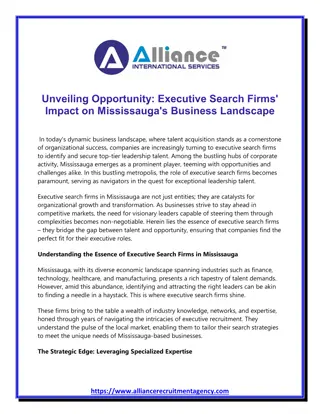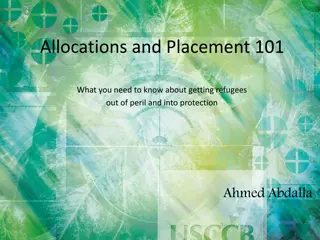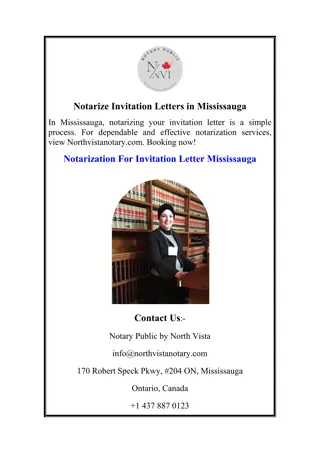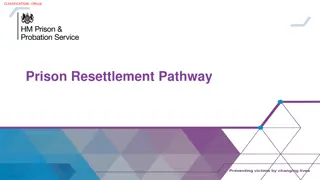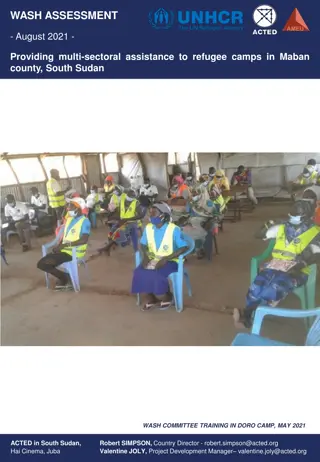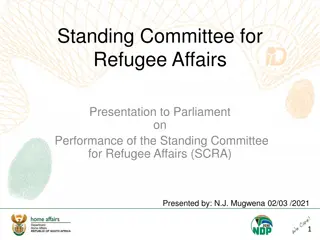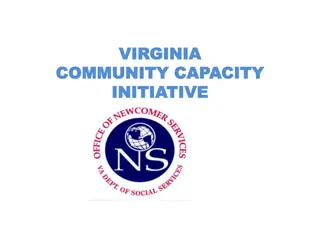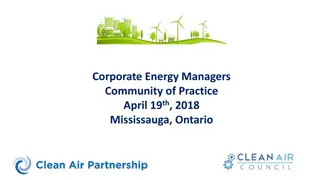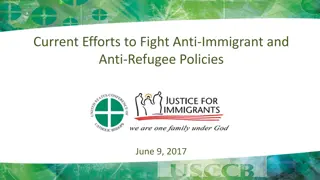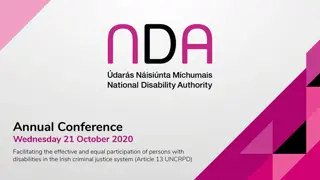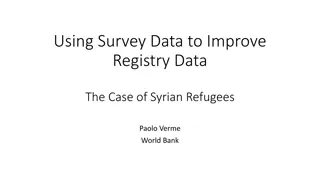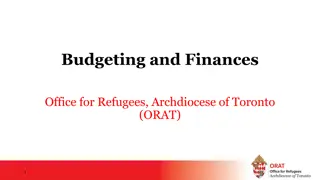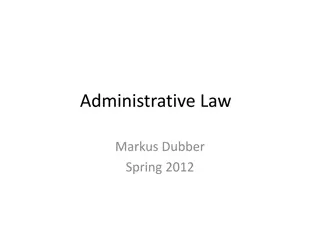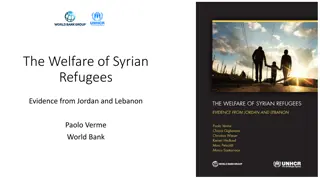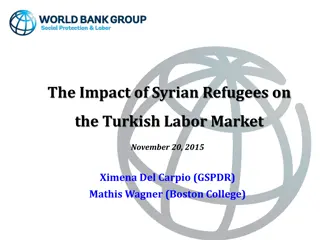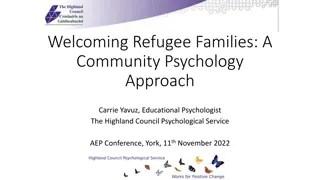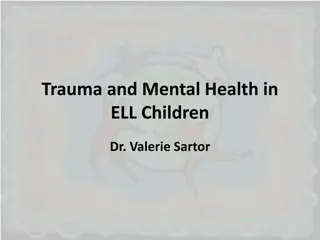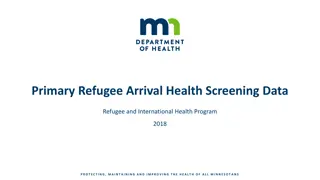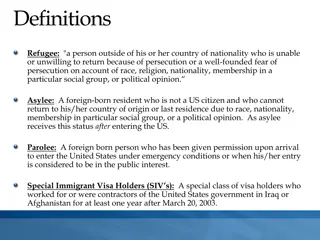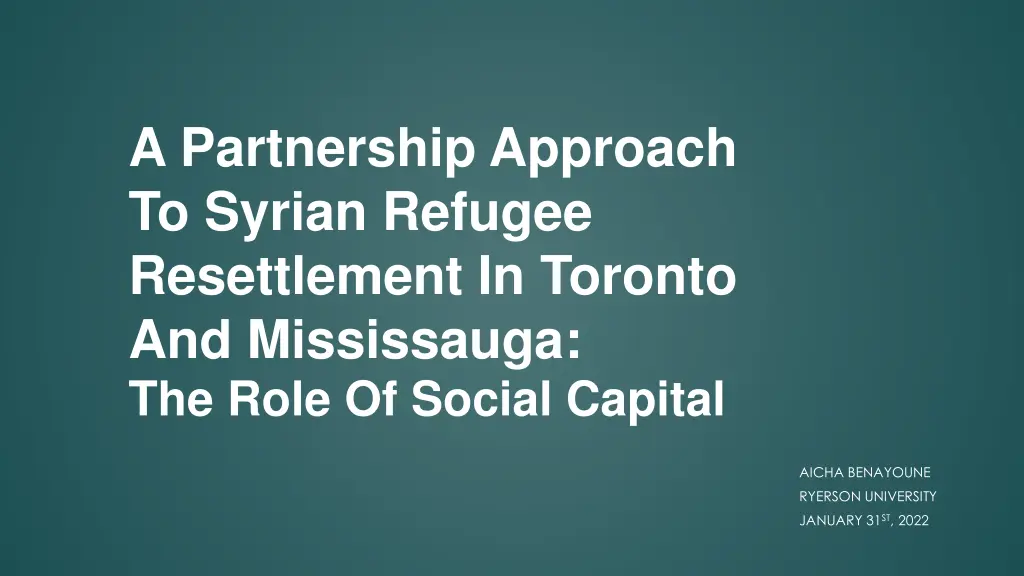
Syrian Refugee Resettlement Study in Toronto and Mississauga
Explore a comprehensive study on Syrian refugee resettlement in Toronto and Mississauga, focusing on social capital, partnerships, and community support. This research sheds light on the role of various stakeholders and the challenges faced by refugees in building new lives in Canada.
Download Presentation

Please find below an Image/Link to download the presentation.
The content on the website is provided AS IS for your information and personal use only. It may not be sold, licensed, or shared on other websites without obtaining consent from the author. If you encounter any issues during the download, it is possible that the publisher has removed the file from their server.
You are allowed to download the files provided on this website for personal or commercial use, subject to the condition that they are used lawfully. All files are the property of their respective owners.
The content on the website is provided AS IS for your information and personal use only. It may not be sold, licensed, or shared on other websites without obtaining consent from the author.
E N D
Presentation Transcript
A Partnership Approach To Syrian Refugee Resettlement In Toronto And Mississauga: The Role Of Social Capital AICHA BENAYOUNE RYERSON UNIVERSITY JANUARY 31ST, 2022
Research Team Primary Investigator: Dr. Usha George, Faculty of Community Services at Ryerson University Project Coordinators: Aicha Benayoune, MSW, RSW Tearney McDermott, M.A. Co-applicants: Dr. Ferzana Chaze (Sheridan College), Dr. Esme Fuller-Thomson (University of Toronto), Dr. John Shields (Ryerson University), Dr. Ka Tat Tsang (University of Toronto), and Dr. Shuguang Wang (Ryerson University). Partners: the Syrian Canadian Foundation, the Syrian Community Centre, CultureLink, the Canadian Centre for Victims of Torture (CCVT), Settlement Assistance and Family Support Services (SAFSS), the Arab Community Centre of Toronto (ACCT), the City of Toronto Newcomer Office, and the YMCA of Greater Toronto This study was funded by the Social Sciences and Humanities Research Council of Canada (SSHRC)
Methodology: Qualitative Focus Groups Group # Gender Sponsorship Category # of Participants Women Men Women Men PSRs GARs GARs Mix of sponsorship categories 11 7 10 8 1 2 3 4 13 semi-structured, qualitative focus groups 123 participants: Men Women Men GARs GARs Mix of sponsorship categories 9 5 6 7 12 6 60 PSRs (35 women and 25 men), 58 GARs (29 women and 29 men); Women Men Men PSRs PSRs Mix of sponsorship categories 13 7 14 8 9 10 4 BVOR men 1 male asylum seeker. Women Mix of sponsorship categories 12 11 Data collection period: Women Mix of sponsorship categories 6 12 December 2018 May 2019 Men GARs 7 13
Methodology: Structured Survey 315 participants: # of Sponsorship Type 147 GARs Participants Government Assisted Refugee 147 157 PSRs Private Sponsored Refugee (relatives) 66 8 BVORs Private Sponsored Refugee (organizations such as church) 6 participants sponsorship types are unknown 81 Private Sponsored Refugee (Group of Five) 7 Blended Data collection period: 8 Other 3 February 2020 September 2020 Missing 3 Total 315
Social capital in Canada prior to immigration Around 1/3 of participants had family members or friends already living in Canada. Support: Housing Information about life in Canada Filling applications Moral support Some refugees who had relatives in Canada didn t receive support from them.
New Connections Sponsors Volunteers: helped with housing, medical appointments, information, house supplies, interpretation and moral support. Neighbours Other refugees: Support each other Formed groups on Facebook or WhatsApp to share information Friends: Participants met people in places of worship, children s schools, and work.
New Connections Difficulty forming relationships with non-Arabs: Lack of opportunities to meet non-Arabs Language barrier Limits their knowledge and exposure to Canadian life Arranging more opportunities to meet non-Arabs Limited Social life: People are too busy Cultural differences Women: lack of physical space Providing a space for women to meet for informal activities
Experiences with settlement organizations Positive experiences: Finding housing Furniture Filling applications Registering children in school Registering in ESL Interpretation Finding family doctors Accessing healthcare services Taxes Providing guidance and general information about life in Canada. Negative experiences: organizations ignored them, didn t return their calls, or never met the worker they were assigned to. 21% believe organizations were only interested in registering them as clients without providing services.
Support for PSRs vs. GARs 33% of PSRs accessed settlement organizations compared to 91% of GARs. 52% of PSRs said they didn t receive help from their sponsors. GARs met volunteers in the hotel or through organizations. 0% of PSRs said that volunteers helped them resettle. Some PSRs were not aware of the free services that are available to them as newcomers. All refugees, regardless of their sponsorship pathway, should be made aware of all the services available to them.
Services after 1st year: 72% said they still need support to reach their goals. Participants requested support beyond the first year of arrival in Canada. Documents and applications The majority of participants face challenges with completing applications and forms. Even though some participants have an adequate level of English, they still need help when it comes to official documents and forms. Some participants said the amount of documents and forms they had to complete was so overwhelming, they didn't understand what they signed. For many participants, filling out forms the correct way and keeping track of everything was a source of stress.
Employment The majority of participants reported difficulties finding employment. 17% employed full time 15% employed part-time 2% self-employed PSRs are more likely to be employed than GARs. Level of education doesn t have an impact on employment. 54% said being unemployed negatively affected their mental health.
Employment Finding work through social connections 48% of those who were employed found work through a friend 18% found it on their own 14% through a sponsor 10% through a family member 10% through an employment program 4% through volunteers.
Barriers to employment Language: Only 15% came to Canada with intermediate or advanced English. 63% felt that language is the main obstacle to employment. 47% said they experienced discrimination because of their language while looking for work. Those with intermediate or advanced language skills are more likely to be employed. Lack of Canadian experience Devaluing previous experience No references How are they supposed to gain Canadian experience if they are not getting hired?
Barriers to employment Accreditation: Syrian capacities are being wasted Requiring certification for certain trades is seen as a barrier to work. No future in Canada Realistic information honest about difficulty of accreditation Start accreditation process before they arrive Refer refugees to their first job Help develop professional networks (mentoring) Internships Volunteering
Barriers to employment Children or childcare as barriers to employment: 12% said lack of child care is a barrier, mainly women Balancing family and work Work creates distance with children Children are a priority over work
Overcoming employment barriers Professionals working blue collar jobs Working any job Working for Arabs Working under the table Employee rights Participants requested to learn more about their rights, especially as employees to prevent being exploited. Participants requested casual meetings with lawyers to educate them about their rights and consult them on any issues they may be experiencing. Volunteering only 1% are volunteers Self-employment - mentoring
Language Language as a barrier: to employment, forming new relationships, education, healthcare, defending themselves in legal matters. Good English: Resettlement was easier for those who speak English more fluently Learning English: The majority of participants took or are still taking ESL classes. 33% intermediate and 13% advanced PSRs are more likely to have intermediate or advanced English. Having a highschool diploma or more could make it easier for some newcomers to learn English. Start learning English before coming to Canada
Language ESL classes ineffective: Many participants felt that they are not making any progress by attending ESL classes. Practicing English: Those who have intermediate or advanced English skills are more likely to have friends who are non-Arab and more likely to have improved their English by interacting with native English speakers. Arranging for refugees to meet non-Arabs to practice English or be immersed in English speaking environments
Housing Help finding housing: help from settlement organizations, community centers, friends, volunteers, other refugees Difficulty finding housing: 40% found difficulty finding accommodations PSRs reported it easier to find housing than GARs These participants were more likely to have intermediate or advanced English Difficulty renting: 40% found difficulty renting Lack of credit history Unemployment Forced to pay several months rent
Mental health Loss Stress and pressure after arrival in Canada: unemployment, not knowing the system, lack of support, and busy lifestyle Sad or depressed Shock Fear and anxiety Hopelessness and despair
Mental health Optimistic about their future in Canada Resilience and strength to keep moving forward 54% said mental health improved after coming to Canada. 33% would like help with their mental health. Stigma: 27% are too embarrassed to seek help with their mental health. Requests for anonymous mental health services
Comments? Questions?

